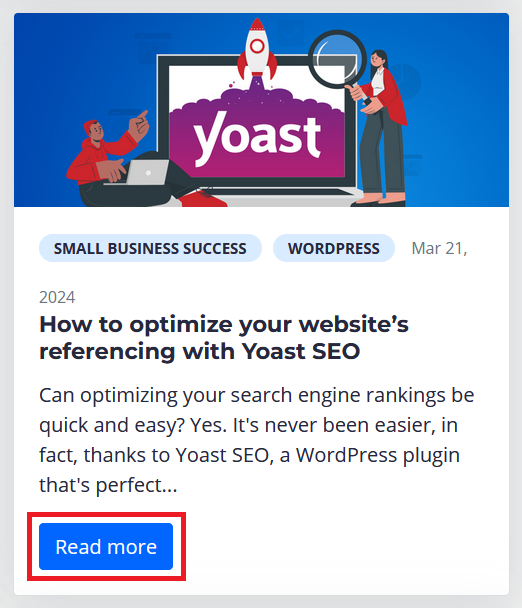
4 types of copywriting for your website
Writing quality texts for a website has become a must. Indeed, well-written texts not only capture visitors' attention quickly but also impact their engagement and the site's performance.
Whether you write your own texts or entrust the task to an expert, it's well worth knowing which style to use in order to give your site an edge.
This article will shed light on the different approaches to copywriting for websites. It will also help you understand how your choice of writing can transform your site, increasing conversions and improving user experience.
- SEO copywriting (or copywriting for search engines)
- Advertising or persuasive copywriting
- Informative or technical copywriting
- UX or user-centered copywriting
- Tips and tricks for writing effective content
- Choosing the right copywriting style for your website
SEO copywriting (or copywriting for search engines)
SEO copywriting is copywriting designed for search engine optimization. This is content tailored to the needs of users and the searches they perform on search engines.
There are three essential elements to consider in SEO copywriting:
- Keywords: thorough keyword research beforehand will greatly help your page's SEO
- Structure: the organization of your content must be optimal (e.g. use headings and sub-headings, making sure to respect the tags specific to each level of heading)
- Content: the quality of your content is paramount – make sure it's relevant, informative and tailored to users' needs
Examples of SEO copywriting
- Blog posts (like the one you're reading right now)
- Descriptions of products or services
- FAQ pages (Frequently Asked Questions)
Advertising or persuasive copywriting
In recent years, persuasive copywriting (formerly known as copywriting) has become increasingly popular. This type of copywriting aims to convince an audience to take action, create a connection, or convey emotions.
Becoming a good copywriter doesn't happen overnight. It requires a number of skills, as well as a working knowledge of persuasive copywriting techniques.
Tips for effective persuasive writing:
- Write concise sentences
- Modulate your tone to suit your target audience
- Adapt your diction to your audience
- Employ storytelling, using bold, evocative words
Of course, a good grasp of consumer psychology, as well as creativity and empathy, are necessary for impactful copywriting.
Examples of persuasive copywriting
- Sales pages
- Email marketing
- Landing pages
- Calls-To-Action (CTAs), such as "Subscribe now" or "Start your free trial" at the end of web content
Informative or technical copywriting
Informative copywriting, on the other hand, adopts a more neutral stance, providing users with useful information in the form of facts and data. This type of copywriting requires the use of reliable sources, which are often included at the bottom of texts.
This type of copywriting is characterized by the use of either more general language, aimed at a wider audience, or more professional and specialized diction, tailored to the needs of a specific audience. However, while technical writing may require the use of domain-specific terms, it's important to avoid excessive jargon and try to explain complex notions in a clear, accessible way.
Examples of informative copywriting
- Educational blog posts
- Institutional websites
- Newsletters
- Product descriptions
- Guides or tutorials
- Frequently Asked Questions (FAQ)
UX or user-centered copywriting
The user experience on a website will, to a large extent, be determined by the writing. UX copywriting is concerned with exactly this: facilitating user navigation. This approach aims to make the overall user experience as fluid, intuitive and pleasant as possible.
The key elements to focus on here are clarity, ease of understanding, accessibility and a reliance on user-friendly terminology. Don't forget that this type of copywriting is meant to encourage action, whether to make a purchase, sign up for a service or navigate through different sections of the site.
This type of writing, often combined with other styles, is used in many ways:
- Action buttons
- Menu
- Error messages, etc.

Tips and tricks for writing effective content
- Understand your target audience
- Write following the KISS principle (Keep It Super Simple)
- Keep it short and to the point
- Avoid lengthy, dense paragraphs
- Make the text accessible and avoid pompous language in a bid to impress
- Focus on reader benefits
Choosing the right copywriting style for your website
Finally, in order to choose the best type of copywriting for your website, it's especially important to define your objectives. Will your site inform or persuade? Are you looking to increase search engine traffic? Your answers will determine your editorial choices. Obviously, a combination of different types of copywriting can also be effective on a website.
Knowing your target audience and understanding their "Why?" will also be instrumental in your choice of copywriting, if only in terms of vocabulary and tone. What's more, an analysis of market trends can guide you in your choice of copywriting.
If necessary, enlist the help of a professional copywriter who can guide you and write content tailored to your needs and target audience.

Also on the WHC Blog

CentOS 7 and CloudLinux 7 reach End Of Life (EOL): Migrate Now!
What’s happening? What are CentOS & CloudLinux? Why upgrade to AlmaLinux 8 instead of CentOS 8? When are CentOS 7 and CloudLinux 7 End of Life (EOL)? What happens once CentOS 7 and CloudLinux...
Read full article
WordPress 6.5 is here with fresh new features
Mark your calendars! April 2nd, 2024 welcomes the arrival of WordPress 6.5, bringing a suite of updates designed to enrich your site's functionality and aesthetic appeal. As part of our commitment at WHC to help you thrive...
Read full article





